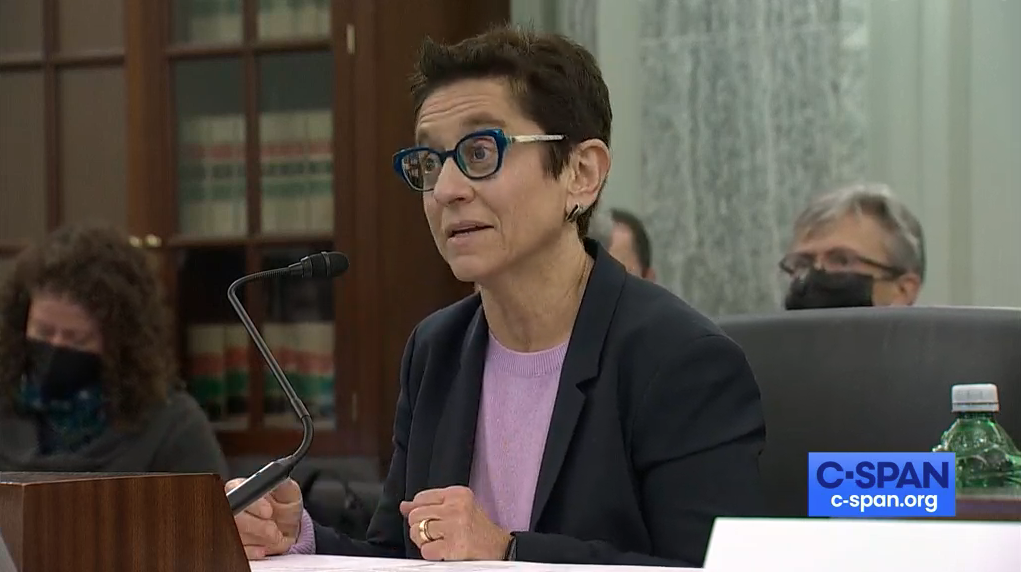Gigi Sohn‘s FCC Nomination Could Face Hold Threats
Effort to slow deregulation by ‘coalition of the freaking out’ may be in play

The smarter way to stay on top of broadcasting and cable industry. Sign up below
You are now subscribed
Your newsletter sign-up was successful
Federal Communications Commission nominee Gigi Sohn could be running into more Republican and industry headwinds in the Biden administration's effort to get a Democratic majority on the agency.
Acting chair Jessica Rosenworcel's nomination for a new five-year hitch — and her designation as chair — was approved Dec. 1 by the Senate Commerce Committee, where she used to be a top staffer, and is expected to get full Senate confirmation soon.
But despite a relative lack of contentiousness in Sohn's confirmation hearing and despite Republicans concerned about her past advocacy for fair use carve-outs for copyrighted material and her criticism of Fox News Channel, there are reports that a hold could be put on her nomination by one of those concerned Republicans.
A definite potential source of the hold is Sen. Thom Tillis (R-N.C.), ranking member on the Senate Intellectual Property Subcommittee. Tillis asked President Joe Biden to withdraw Sohn's nomination, saying he had many concerns but copyright was chief among them. On Monday (Dec. 6), his office confirmed he would do whatever he could to stop the nomination, including placing a hold.
While Tillis has expressed concerns about Sohn's views on fair use exemptions from copyright, he is also not a fan of restoring net neutrality regulations, something Sohn has supported and still does and the issue one source said would more likely drive a hold. Tillis’s office had not returned a request for comment at press time on whether, and if so why, he was planning a hold.
Another possible hold source is Sen. Dan Sullivan (R-Alaska), arguably her toughest opponent at the nomination hearing, particularly over the issue of her past tweets critical of Fox News. “You have clearly indicated your bias against more conservative news sources,” he said.
The hold could have backers among both internet service providers and broadcasters, ISPs over that net neutrality stand and broadcasters over signals she’s sent that she could support restoring some broadcast regulation, a group one source characterized as “the coalition of the freaking out.”
The smarter way to stay on top of broadcasting and cable industry. Sign up below
Democrats will need a majority to push through either of those initiatives. Broadcasters have also cited Sohn's directorship at Locast, the TV-station streaming service that shuttered after a court concluded it did not have a copyright exemption. Tillis brought that up in his letter to Biden seeking the withdrawal.
There doesn’t seem to be the same “freaking out coalition” raising Tillis’s copyright concerns. And Sohn has some fans — or at least "non-opponents" — in the copyright community given her ability to come to the table, as was the case with the copyright alert system when she headed fair-use advocate Public Knowledge, as well as the compromise net neutrality rules under former FCC chairman Julius Genachowski, that were not based in classifying broadband as a telecommunications service under Title II of the Telecommunications Act.
But Sohn stumped for Title II-based rules under Genachowski’s FCC successor, Tom Wheeler, and Title II has regained popularity under the new administration and with congressional leadership, a momentum that could be powering opposition to Sohn.
Any senator can put on hold on a nominee for any or no reason — the hold prevents a measure from coming to the floor — and does not have to identify themselves. It then would take 60 votes to proceed with a vote on her nomination, similar to invoking cloture to end a filibuster.
Sohn's nomination won't get a committee vote, absent the hold, until at least mid-month.
Senators had until Monday (Dec. 6) at noon to submit written questions and Sohn gets a week to respond.
If Sohn does secure the FCC nomination, she would be its first openly gay commissioner, a point Biden made in her nomination. ■
Contributing editor John Eggerton has been an editor and/or writer on media regulation, legislation and policy for over four decades, including covering the FCC, FTC, Congress, the major media trade associations, and the federal courts. In addition to Multichannel News and Broadcasting + Cable, his work has appeared in Radio World, TV Technology, TV Fax, This Week in Consumer Electronics, Variety and the Encyclopedia Britannica.

